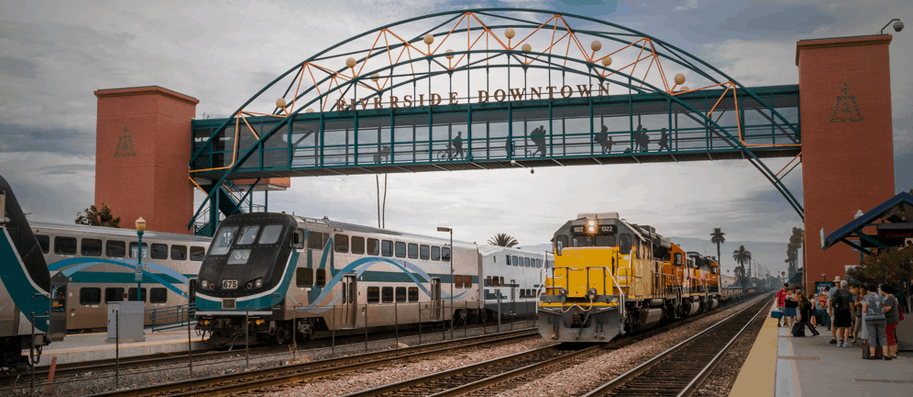The internet has permanently altered the dynamic for a fledgling business. Access to a robust connection is no longer just beneficial for a startup; it’s essential.
It’s also lucrative; internet-empowered startups contribute more than $1 trillion to America’s GDP – and that number is on the rise.
What about the practical benefits? Faster broadband speeds mean less time spent by employees staring at a screen as a file takes forever to download, and fewer meetings that are interrupted by stutters and disconnects. It means being more connected (and visible) to your customers. Savvy business leaders know this, and are beginning to hone in on areas around the country where conditions are primed for explosive growth.
So, where should you build your next startup? For this list, we focused on mid-sized cities with robust access to highest-speed internet options. We also factored in three essential qualities for founders: cost of living, startup culture and local culture.
If you’re aiming to get your business off the ground in 2019, these rapidly-growing hubs should be on your radar. Some of them have established gigabit services available right now, while others are positioned for rapid broadband infrastructure expansion in the near future.

1. Riverside, CA

 Due to its close proximity to Los Angeles, Riverside enjoys some of the fastest internet speeds in the nation. Though the city itself doesn’t have municipal internet infrastructure available, companies like Spectrum and AT&T offer 300 Mbps and 1,000 Mbps options, respectively. In addition, fixed wireless providers like One Ring Networks offer 1,000 Mbps service tiers. This wealth of options makes Riverside an ideal spot for a forward-thinking startup.
Due to its close proximity to Los Angeles, Riverside enjoys some of the fastest internet speeds in the nation. Though the city itself doesn’t have municipal internet infrastructure available, companies like Spectrum and AT&T offer 300 Mbps and 1,000 Mbps options, respectively. In addition, fixed wireless providers like One Ring Networks offer 1,000 Mbps service tiers. This wealth of options makes Riverside an ideal spot for a forward-thinking startup.
In fact, several exciting startup operations already call Riverside home, and their numbers are growing rapidly. Innovative tech companies such as Grow Games Interactive and WAZO contribute to the expanding list. Due to significant investments on behalf of the city itself (more on this below), Riverside’s business community is likely to spawn several household names over the next decade or so.
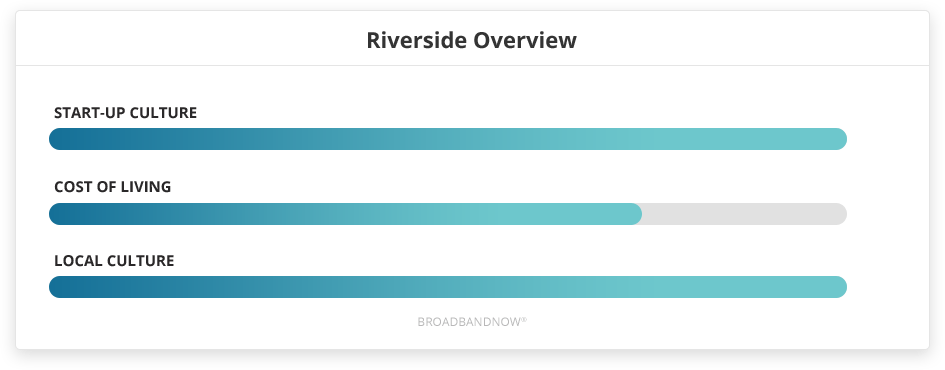
Startup Culture
Though Riverside isn’t quite as popular as its larger neighbor Los Angeles, in recent years, the city has been making excellent progress building out its own compelling business culture. Several incubators and accelerators have opened up, such as ExCITERiverside, a collaboration between business leaders, the city itself, and the local university. In addition, the city plays host to a variety of coworking spaces as well, cementing it as a hotbed for entrepreneurial innovation. For a full list of options, click here.
Cost of Living
According to BestPlaces, Riverside is more expensive than the average U.S. city, mainly due to increased housing costs (but this is typical of California in general, to be fair). The average two-bedroom apartment will run you roughly $1,163, while a home will cost about $396,200. Compared to the U.S. average of $216,200, this is again high, but California as a whole sits at $548,100, making the city one of the more attractive options in the state.
Local Culture
One of the obvious appeals of Riverside’s location is its proximity to Los Angeles, a city considered by many to be the cultural capital of the nation. The sprawling area is notoriously expensive to call home, so being just a short commute away from all of the sights and sounds is a very real bonus for the right individual. Not to mention, you’re only about an hour away from the beach. Weather-wise, Riverside looks like the rest of the greater Los Angeles area; hot, dry summers and mild, somewhat wet winters.
2. Chattanooga, TN

 Fortune recently called Chattanooga one of America’s most startup-friendly cities, and businesses seem to agree; several notable operations call the city home, and dozens more are likely to join them in the coming years. Tech companies in particular seem to be taking an interest in Chattanooga, with successful outfits like Skuid and AudiencePoint leading the charge.
Fortune recently called Chattanooga one of America’s most startup-friendly cities, and businesses seem to agree; several notable operations call the city home, and dozens more are likely to join them in the coming years. Tech companies in particular seem to be taking an interest in Chattanooga, with successful outfits like Skuid and AudiencePoint leading the charge.
Chattanooga enjoys an expansive gigabit municipal internet connection through EPB. In addition, Comcast Business, AT&T, and Spectrum Business all offer decent speeds and plans, but none of them can compete directly with what the city itself offers. EPB’s network has led to an undeniable “tech boom” for Chattanooga, which has been transformed into a thriving urban hub with plenty of room to grow.
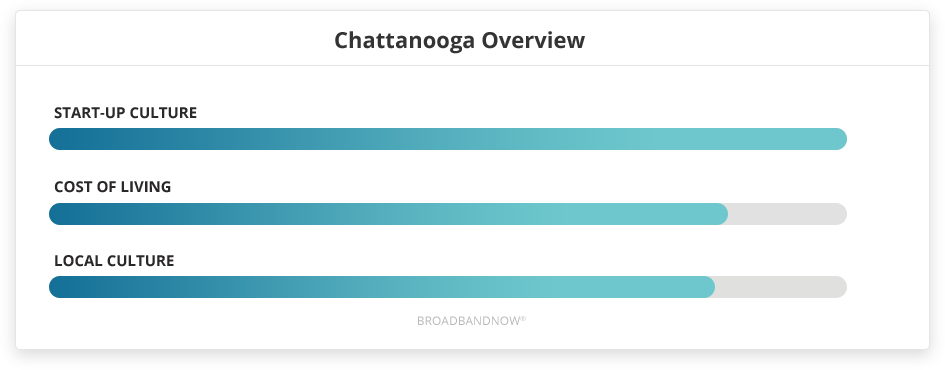
Startup Culture
Chattanooga has not always been the rapidly expanding hub it is today; in fact, just a decade ago, you wouldn’t find nearly anyone working at a startup in the city. The installation of “the Gig,” EPB’s citywide municipal gigabit network first put in place in 2013, changed everything. In just a few short years, it has completely transformed the culture of work within the city, giving rise to what is now the largest business incubator in Tennessee (and third largest in the nation), INCubator. In addition, several coworking spaces have popped up around the area, such as Society of Work and Workhorse.
Cost of Living
BestPlaces puts Chattanooga a bit under the average cost of living in America, with the median home price listed at $140,300, down from the state average of $156,800. A two-bedroom apartment sits around $767, making it one of the most affordable cities for renting in the country. As Chattanooga’s tech scene continues to grow and develop, you can expect these prices to increase in kind, but for the moment, it remains an inexpensive place to plant roots.
Local Culture
Chattanooga is situated on the banks of the Tennessee River, and offers a large assortment of attractions and cultural celebrations to take part in. A recent mass-renovation of the waterfront area has only served to improve the cultural identity that the city has been building for years, adding new experiences and dining options for residents to enjoy. Chattanooga’s climate is mild in the winter, and snowfall is not common. In the summer, temperatures are hot and humid, with a daily average of around 80 degrees Fahrenheit.
3. Richmond, VA

 Richmond may not be nationally known for its high-profile startup scene, but the city has been working quietly to change that. Operations such as LendUp, Knox Payments, Grid 20/20, and Envera Health have all contributed to putting the city on the entrepreneurial map, and we’re betting on this trend continuing in 2019 and beyond. Richmond is also a popular location for “innovation offices” of large companies like CarMax.
Richmond may not be nationally known for its high-profile startup scene, but the city has been working quietly to change that. Operations such as LendUp, Knox Payments, Grid 20/20, and Envera Health have all contributed to putting the city on the entrepreneurial map, and we’re betting on this trend continuing in 2019 and beyond. Richmond is also a popular location for “innovation offices” of large companies like CarMax.
Verizon Fios, CenturyLink Business and several other providers offer up to 1,000 Mbps internet speeds in the area, and companies like Comcast Business offers up to 400 Mbps. As the startup scene in Richmond continues to expand, more options will undoubtedly present themselves as well.
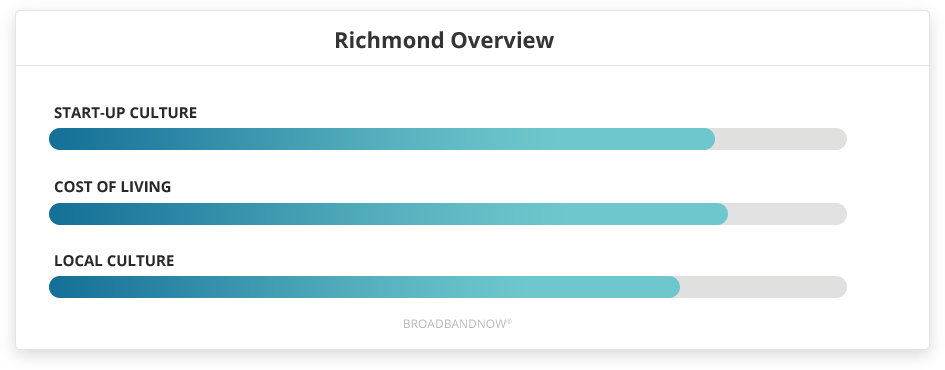
Startup Culture
In response to the burgeoning startup scene taking root in the city, incubators such as Startup Virginia, BizWorks, and 1717 Innovation Center have sprung up in spots around the city. Though there aren’t as many coworking spaces here as in a few other cities on the list, several options exist, such as 804RVA and Gather.
Cost of Living
Richmond’s living costs are just under the national average, primarily due to the slightly lower cost of property in and around the city. Median home cost is $207,400, compared to $252,700 in Virginia as a whole. A two-bedroom apartment will run you $916 a month. Richmond is constantly changing, and as it works to make further improvements to its business culture, these prices may fluctuate. For now, however, the housing market is relatively stable, making it a great place to get in on the ground floor.
Local Culture
Richmond has a rich history of culture, both in terms of the arts and in the many outdoor recreation activities offered in the surrounding area. If you’re looking for a medium-sized town with some character, there’s a lot to enjoy here. Richmond has been undergoing a cultural boom for young professionals as 20-to-30-something creatives get priced out of nearby hubs like DC or NYC, and has a thriving art scene built around Virginia Commonwealth University, one of the biggest art schools in the U.S.
4. Gainesville, FL

 Several areas around Gainesville are covered by the city’s own GatorNet network, which offers gigabit speeds built into the rent prices of dozens of apartments and neighborhoods around town. Outside of this option, providers like AT&T Fiber and CenturyLink Business offer enterprise solutions providing up to 1000 Mbps speeds.
Several areas around Gainesville are covered by the city’s own GatorNet network, which offers gigabit speeds built into the rent prices of dozens of apartments and neighborhoods around town. Outside of this option, providers like AT&T Fiber and CenturyLink Business offer enterprise solutions providing up to 1000 Mbps speeds.
Gainesville plays host to a number of innovative tech companies, such as Feathr, Digital Brands, and MindTree. In addition, the city is known as the birthplace of now-defunct upstart GrooveShark, which experienced massive initial success before ultimately shutting down after a series of disputes with major record labels. All the same, the company and its late founder Josh Greenburg, helped cement the entrepreneurial spirit that now defines the city. Looking to the future, Gainesville wants to be an even larger part of the rapidly-growing tech scene in America.
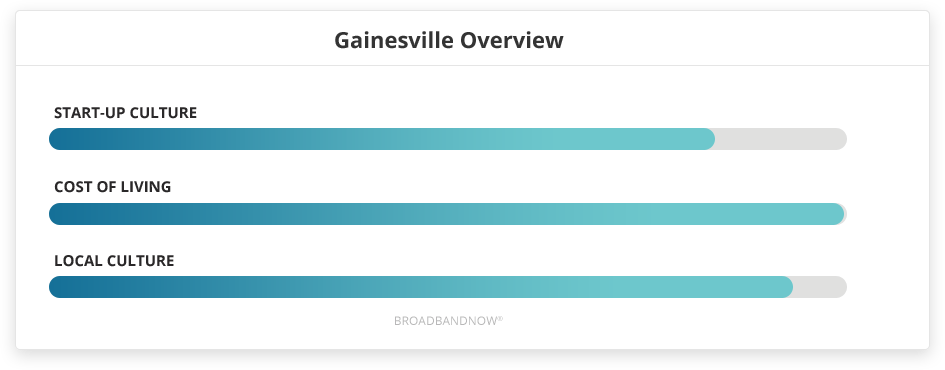
Startup Culture
Gainesville has a wide variety of incubation options within city limits, including the Gainesville Hackerspace, Blue Oven Kitchens, GatorLab, and more. In terms of coworking spaces, the city has a few options to offer, including Starter Space and the Mind Space Collective. With a fast-growing population, the city is bound to see more and more places popping up for those looking to collaborate.
Cost of Living
Gainesville offers some excellent home pricing to those looking to buy property, with the median price sitting right at $173,700. Compared to Florida’s average of $222,000, there’s some serious value to be had here. The average two-bedroom apartment will run you $896 monthly, putting it well under the national average of $1,026. If you’re looking to get started in Florida, Gainesville is a solid option.
Local Culture
If you like music, Gainesville is for you; the city has spawned some of the nations top acts, including everything from The Eagles, Against Me!, Tom Petty and The Heartbreakers, and Don Felder. The University of Florida College of The Arts has a major presence in the area, contributing to several of the city’s major festivals and cultural events. Gainesville’s inland location makes its weather somewhat different from many other Floridian cities; temperatures are usually hot and clear in the summer, and very mild in the winter. As you can imagine, snow is extremely rare, and the city rarely experiences the brunt of any of the hurricanes the state is known for.
5. Boulder, CO

 The Boulder startup scene is highly diverse. The small town of 100,000 people plays host to innovative, forward-thinking outfits such as Gitcoin, Bonusly, Wunder Capital, and Product School. It has also seen some high-profile acquisitions in recent years, such as Gnip, a Twitter analytics company that made waves when it announced its insane Historical PowerTrack tool, which allows you to find and compare any tweet ever penned on the massive social platform. Twitter purchased the group for $134.1 million in 2014.
The Boulder startup scene is highly diverse. The small town of 100,000 people plays host to innovative, forward-thinking outfits such as Gitcoin, Bonusly, Wunder Capital, and Product School. It has also seen some high-profile acquisitions in recent years, such as Gnip, a Twitter analytics company that made waves when it announced its insane Historical PowerTrack tool, which allows you to find and compare any tweet ever penned on the massive social platform. Twitter purchased the group for $134.1 million in 2014.
Both CenturyLink Business and Level 3 offer gigabit speeds in the area, with several other providers advertising 200-300 Mbps networks as well. For startups who rely on ultra high-speed internet access, Boulder delivers.
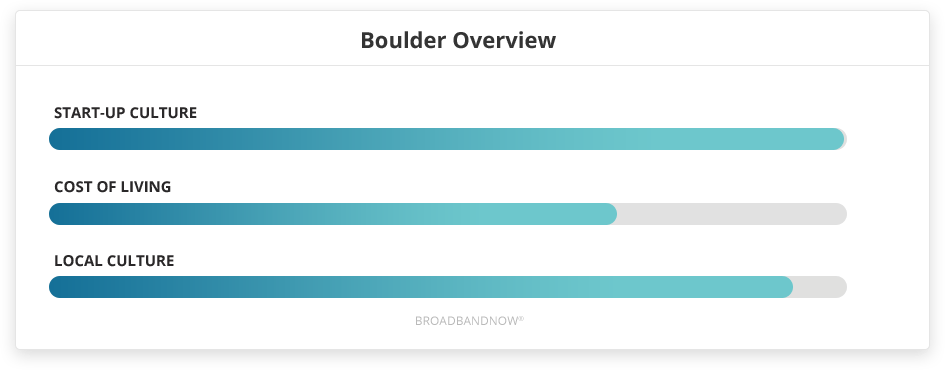
Startup Culture
Boulder is home to a tight-knit community of entrepreneurs, and it shows in terms of the facilities and programs available within city limits. For one, the city hosts the extremely popular business accelerator program TechStars, which has helped over 150 startups get acquisition deals, including companies such as Simply Measured, Digital Ocean, and SendGrid. You can also find a wide variety of coworking spaces littered throughout town, many of which have joined under one brand as the Boulder Coworking Alliance.
Cost of Living
Boulder living costs are much higher than the U.S. average, primarily due to the massively inflated housing market in greater Colorado. Being a destination city at the gateway of the Rockies comes at a steep price, with the median home cost sitting at $711,800, compared to $216,200 nationwide. A two-bedroom apartment sits right at $1,465 on average, according to BestPlaces. These costs aren’t expected to see a steep rise over the next few years, but given that they are already quite high relative to the rest of the cities on this list, this is an important consideration to make.
Local Culture
As mentioned above, Boulder is situated at the foot of the Rocky Mountains, one of the most stunning natural features found in America. With incredible destinations such as the Rocky Mountain National Park and dozens of ski resorts within a few hours driving distance, Boulder is the ultimate outdoor pursuits city. The weather in and around the Boulder area is temperate, with warm, clear summer days giving way to frequent snowfall and freezing temperatures in the winter.
6. Ashland, OR

 Ashland has been long known as a sleepy town situated in the foothills of Southern Oregon, but it’s set to shake that reputation in the coming years if current trends are anything to go on. Companies like Brammo, MustHaveMenus, and Erndo already serve to illustrate the small town’s wide-ranging scene, and though things are really just getting going for this “Sustainable Valley” community, it’s one to watch closely in the coming years.
Ashland has been long known as a sleepy town situated in the foothills of Southern Oregon, but it’s set to shake that reputation in the coming years if current trends are anything to go on. Companies like Brammo, MustHaveMenus, and Erndo already serve to illustrate the small town’s wide-ranging scene, and though things are really just getting going for this “Sustainable Valley” community, it’s one to watch closely in the coming years.
Ashland features a citywide municipal fiber network, appropriately named the Ashland Fiber Network. The service offers a range of options, but the enterprise plans currently top out at 220 Mbps. CenturyLink Business and Spectrum both offer services at around 100 Mbps, and while this is quite a bit lower than many of the other cities on this list, we felt that Ashland still deserved to be included. As the small town continues its transformation into a bustling tech center, the speeds (and options) available are likely to increase in kind.
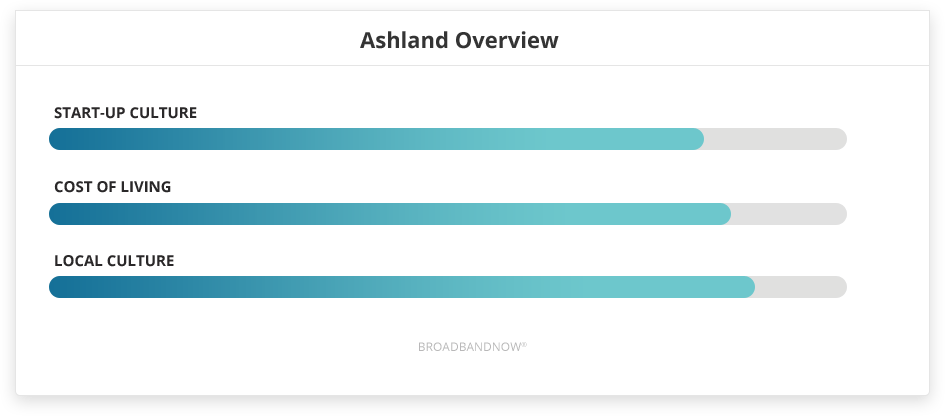
Startup Culture
To kick the spirit of entrepreneurship in Ashland into high gear, a partnership under the name LAUNCH Ashland was created with the sole focus of shepherding and developing new businesses in the area, preparing them for acquisition down the line. As far as quality coworking spaces, the mountain town already has several options to choose from, including Rogue Coworks and Mojo Coworking.
Cost of Living
Ashland sits a bit above the average American living costs in terms of housing prices, but actually comes out ahead when it comes to rental prices. At $456,600, the city’s real estate pricing surges ahead of the state median of $331,400. That said, a two-bedroom apartment in the area costs an average of $870, according to data from BestPlaces. Regardless of the slightly higher property price tag, Ashland remains one of the most flatly affordable cities on this list.
Local Culture
Situated near the California-Oregon border, Ashland’s remote location in a valley just outside the Klamath National Forest is ideal for those who enjoy nature and solitude. The city is home to Southern Oregon University, as well as a variety of museums and other small tourist attractions. It won’t win any awards for engaging nightlife, but if a quieter, more community-minded city is what you have in mind for your business, Ashland may fit the bill. The small town enjoys a moderate summer, with temperatures in the mid to high 80’s, and a wet, cool winter, seeing over 100 inches of rain a year on average.
7. Park City, UT

 Though less than 8,000 individuals call Park City their year-round home, the ski town has been making quite a name for itself amongst entrepreneurial circles in recent years. Breakout successes such as headphone maker Skullcandy and online marketplace Backcountry.com both got their start here, and several exciting newcomers like ZipRider and Loop Messenger are now picking up the mantle.
Though less than 8,000 individuals call Park City their year-round home, the ski town has been making quite a name for itself amongst entrepreneurial circles in recent years. Breakout successes such as headphone maker Skullcandy and online marketplace Backcountry.com both got their start here, and several exciting newcomers like ZipRider and Loop Messenger are now picking up the mantle.
Park City doesn’t currently have any public internet infrastructure in place, and due to its mountainous location and Utah’s restrictive procedure for implementing them, it may not be on the horizon. Luckily, at least two providers currently offer gigabit business speeds in the area, including All West Communications and Veracity Networks, so startups will have no shortage of options to choose from here.
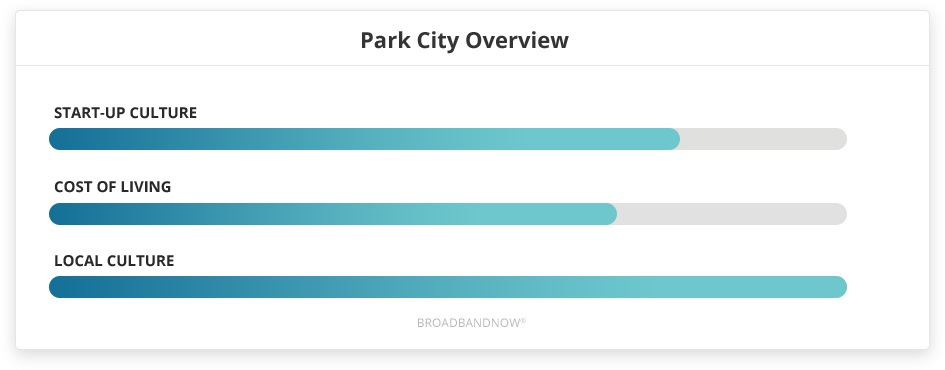
Startup Culture
Park City may be known primarily for its ski and film culture, but that is about to change; groups like the Park City Angels are beginning to transform the small town’s reputation, and offshoots like the incubator program known as PandoLabs represent the direct result of this effort. In addition, coworking spaces like Assemble are beginning to meet the increased demand that will surely only grow as Park City continues to cultivate its new image.
Cost of Living
Due to its status as a resort town, Park City has some of the highest real estate pricing in the state, sitting at a median cost of $703,800, up from $302,000 (and $216,200 on the national level). Rental pricing is thankfully much more in-line with the rest of the nation, with prices averaging around $1,030 per month. It’s not the cheapest option out there, but if you’re looking for a dynamic, exciting outdoor environment to build the company of your dreams, Park City is well worth a serious consideration.
Local Culture
Being a resort town through and through, there are no shortage of attractions to be found here, if you like being outside in the snow that is. Park City is also home to the Sundance Film Festival, which is the U.S.’s largest independent film festival. Sitting at 7,000 ft elevation, the resort town sees pleasant, warm summers and cold, snowy winters.
8. Flagstaff, AZ

 Flagstaff has recently seen a huge influx of biomedical upstarts take root in its community, including notable ventures such as POBA Medical and Symple Surgical. Other companies like Protein Genomics and Aneuvas round out the list, making Flagstaff a destination to contend with in the wider industry.
Flagstaff has recently seen a huge influx of biomedical upstarts take root in its community, including notable ventures such as POBA Medical and Symple Surgical. Other companies like Protein Genomics and Aneuvas round out the list, making Flagstaff a destination to contend with in the wider industry.
Flagstaff has no municipal internet service, but several companies do offer enterprise connections in the area, including CenturyLink, SpeedConnect, and SuddenLink, with the latter offering gigabit speeds.
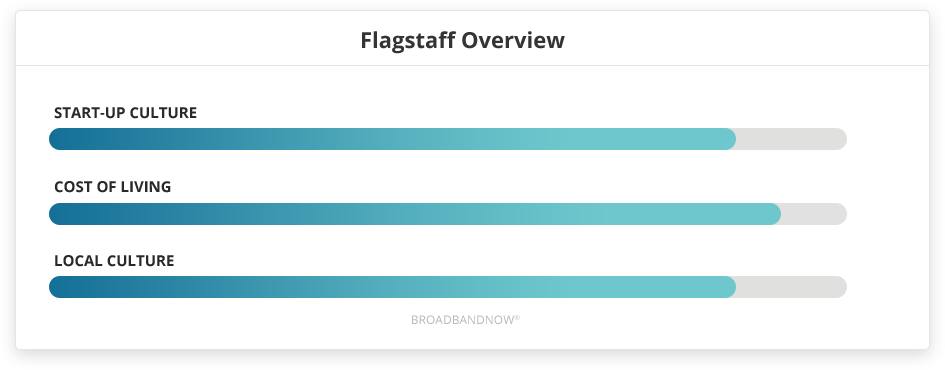
Startup Culture
Flagstaff’s fledgling entrepreneurial scene is supported by incubator’s like NACET, whose “Moonshot” programs had a hand in several of the company’s mentioned above as they were just getting off the ground. In addition, the city features several different unique coworking spaces, including Click, Uptown Offices, and The Nest.
Cost of Living
Flagstaff is a small city of under 100,000 residents, and rental prices reflect this; a two-bedroom apartment averages around $1,067 monthly, whereas the median home price was $354,800. The small mountain town has a growing population, so these prices may continue to fluctuate over the coming years as more and more new residents are drawn into the city.
Local Culture
Flagstaff has a very active cultural scene, and the city is becoming a small but growing hub for outdoors activities, primarily due to its proximity to a wide range of natural features ranging from lush forests to high mountains and desert mesas. The city sees a unique weather pattern with five distinct seasons, ranging from dry, pleasant falls to deep snows in early spring. For most of the year, however, temperatures are very mild, contributing further to the already-active outdoors scene the city is becoming known for.
9. Holland, MI

 Holland is one of the most unknown towns on this list, but that hasn’t stopped it from taking the #1 spot in WalletHub’s “Best Cities to Start A Business” guide. The city already has a growing presence in logistics and services, with companies such as the innovative waste management operation Cocoa leading the charge. There are also a number of successful tech-focused ventures of note, such as Orendi Mask and Fathom.
Holland is one of the most unknown towns on this list, but that hasn’t stopped it from taking the #1 spot in WalletHub’s “Best Cities to Start A Business” guide. The city already has a growing presence in logistics and services, with companies such as the innovative waste management operation Cocoa leading the charge. There are also a number of successful tech-focused ventures of note, such as Orendi Mask and Fathom.
In many areas around Holland, the community-owned Holland Fiber Network is available to businesses and consumers alike, offering gigabit speeds at competitive prices. If you aren’t within the coverage area, there’s another gigabit option in Everstream, as well as several slightly lower-speed options from Comcast, Verizon, Frontier, and more.
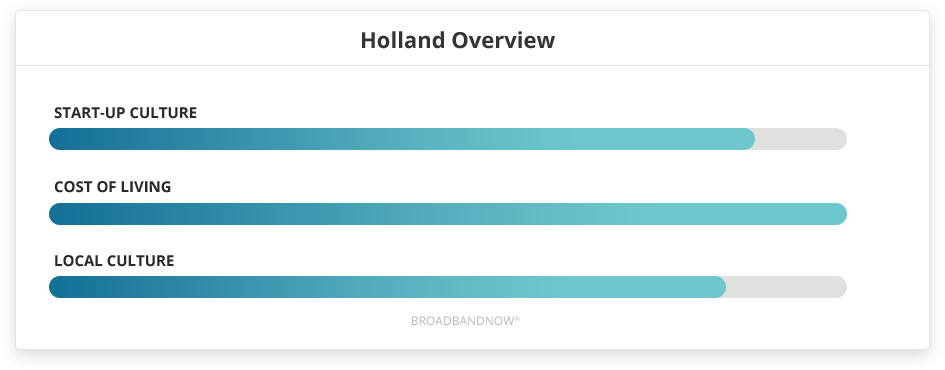
Startup Culture
Due to many of the successes mentioned above, thriving business incubators like Lakeshore Advantage have begun cropping up to facilitate the next generation of entrepreneurial growth in the area. There’s plenty of places to get work done as well, with popular coworking spots such as Treehuis, The Space, Baker Lofts, and Baker Commons all within city limits.
Cost of Living
Holland’s small-town vibe and incognito national footprint have helped it remain one of the most affordable cities to start a business in, and that holds true today. With an average two-bedroom apartment monthly rent of $760 and a median home price of $182,600, Holland enjoys prices noticeably below the national average. Best of all, these aren’t likely to change rapidly anytime soon, even if the city continues to grow in the coming years.
Local Culture
Holland is best known (and aptly named) for its Dutch heritage, and as such, many of the cultural activities revolve around this influence. It’s more of a retirement town than a party haven, but as the business culture continues to grow, this may soon begin to change. Like most of Michigan, Holland has warm, mild summers and frozen winters. Snow is a regular occurrence as well, as freezing temperatures are expected almost every single night in the colder months.
10. Cheyenne, WY

 Wyoming doesn’t have any cities with more than 75,000 residents, but that hasn’t stopped standouts like Cheyenne from aspiring to be a part of the innovation economy. The capital city is already home to a wide variety of startup operations, such as TimeWalk and Wealth Venue, just to name a few. As more investors and innovators discover this hidden gem of a town, it may just see an explosive period of growth in the next few years.
Wyoming doesn’t have any cities with more than 75,000 residents, but that hasn’t stopped standouts like Cheyenne from aspiring to be a part of the innovation economy. The capital city is already home to a wide variety of startup operations, such as TimeWalk and Wealth Venue, just to name a few. As more investors and innovators discover this hidden gem of a town, it may just see an explosive period of growth in the next few years.
Though Cheyenne’s business scene is growing rapidly, its internet infrastructure is a bit behind the curve, compared to most other cities on this list anyway. Providers like Spectrum Business and CenturyLink Business offer 100 Mbps speeds at their peak, which while more than enough for the average consumer, may be a bit limiting for business needs. With luck, as the local tech economy begins to flesh itself out, new options will crop up for businesses to take advantage of.
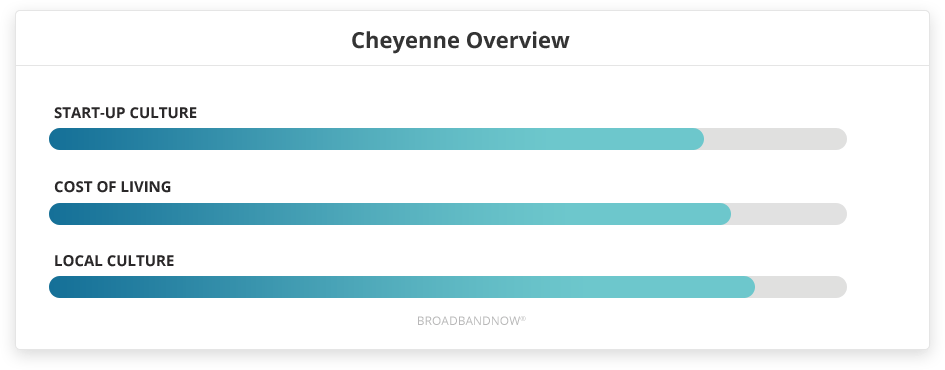
Startup Culture
In 2016, The Array School of Technology and Design opened its doors in downtown Cheyenne. This was a huge move for the city, because it is one of the only local programs that is equipped to teach inexperienced novices how to become adept at many of the modern skills sought after in business, such as programming, web design, and coding. In addition, the first coworking space in the city, The Second Floor, recently opened its doors, and more spaces are set to open in the coming months. In truth, Cheyenne’s business culture is just getting off the ground, but it has a promising future ahead.
Cost of Living
Living in Cheyenne isn’t as expensive as many of the larger hubs on this list, but prices are pretty middle-of-the-road compared to the national average. The median cost of a home in the city is about $239,100, according to BestPlaces, and the average two-bedroom apartment will run about $757 a month. These prices are expected to stay more or less stable over the next few years, so if you’re looking to invest in a city early-on, this is a great choice to consider.
Local Culture
Cheyenne has a lot going for it; small-town vibe (despite being a capital city), gorgeous mountain scenery, and a spirit of adventure that rivals many other, more popular areas of the U.S. Plenty of nature trails dot the city, making it a natural choice for the outdoors-inclined, and a mild climate does nothing to change that. Temperatures range from warm and dry in the summer to cool and still mostly-dry in the winter, with most snow precipitation taking place in the short spring season.
